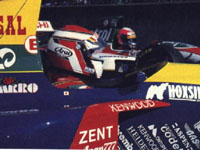The belated Grand Prix debut of one of Japan's best
Author
- Mattijs Diepraam
Date
- 8W September 1998 issue
Related articles
- Jean-Marc Gounon - Another one of France's wasted generation, by Mattijs Diepraam
- Aguri Suzuki - The most successful Japanese GP driver (to date?), by Mattijs Diepraam
Who?Toshio Suzuki (Pedro Lamy) What?Larrousse-Lamborghini LH93 (Lotus-Ford 107B) Where?Suzuka When?1993 Japanese GP |
 |
Why?
In the early nineties, whenever the end-of-season Pacific double header at Suzuka and Adelaide came up, Gerard Larrousse's team was in the habit of selling its seats to the highest bidder.
In 1993 Japanese veteran Toshio Suzuki (no relative of Aguri) snapped up one of the Larrousse-Lamborghinis for a Grand Prix debut at the late age of 38. A front-runner in Japan's top category, Japanese F3000, he had bags of sponsor money to offer Larrousse. He had been too young to be involved with the first Japanese wave in F1, when the likes of Kazuyoshi Hoshino and Masahiro Hasemi upset the regulars at their home GP at Fuji in the mid-seventies. But now, with the Japanese economy booming and Japanese F3000 receiving high international acclaim, he finally had a chance to be in the limelight for his country just once. His aims were as modest as his qualifying positions, however - the goal was taking the car to the finish unscathed, which he duly did in both races.
After his two F1 appearances Toshio returned to Japanese F3000, where he remained at the sharp of the grid, even snatching the title at the last gasp for Hoshino Racing in 1995. Suzuki nowadays is still a force to be reckoned with in Japanese motorsport. Although he has forsaken his F Nippon seat to the younger generation in Japan he remains a works Nissan driver in GTs and sportscars. At the 1998 Le Mans race he teamed up once more with Hoshino in the NISMO Nissan, a combination (together with Hasemi) that won the 1992 Daytona 24 Hours. This time with Masahiko Kageyama as a third driver the Japanese crew took a strong third at the Sarthe.
